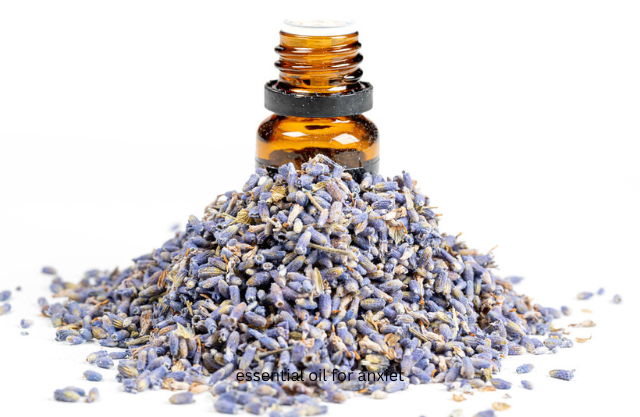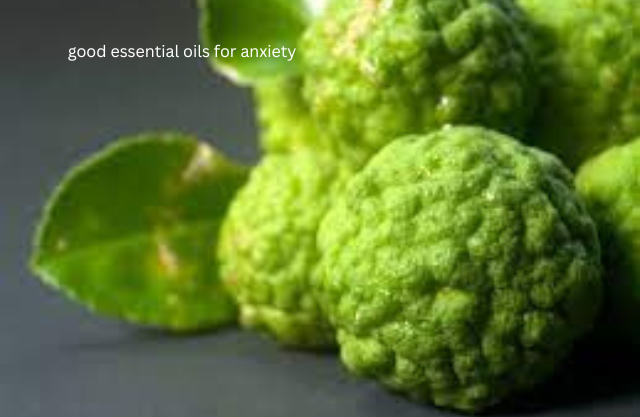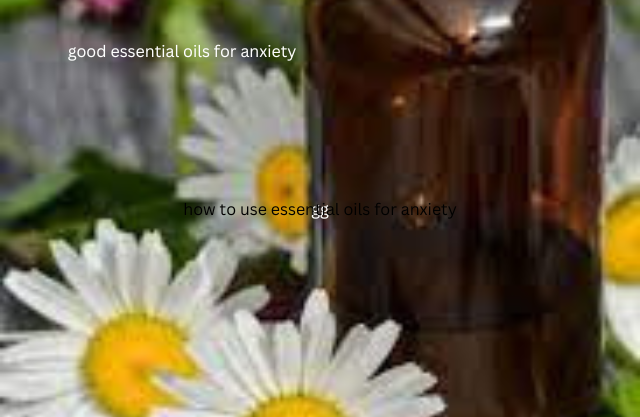Anxiety is a common condition that affects millions of people worldwide. While there are various treatments available, many people are turning to natural remedies to help alleviate their symptoms. One such remedy is the use of essential oils for anxiety, particularly those that are known for their calming and soothing properties. In this guide, we will explore the benefits of using essential oil for anxiety and stress relief and how it can help promote a sense of relaxation.
What Are Essential Oils and How Can They Help With Anxiety?
Essential oils are concentrated plant extracts that are obtained through distillation or cold pressing. There are many different types of essential oils, each with its own unique benefits. They contain the natural fragrance, or "essence," of the plant from which they are extracted. Essential oils are used in a variety of ways, including aromatherapy, massage, and topical application.
Essential oils have been used for centuries to help relieve anxiety and stress. The best way to find the perfect blend for your needs is to experiment with a few different kinds of plants and aromatherapy products before finding what works best for you.
The Benefits of Essential Oil for Anxiety Stress And Depression
Essential oils have been used for centuries to promote physical and emotional well-being. When it comes to anxiety, essential oils are believed to have a calming effect on the body and mind. They work by stimulating the olfactory receptors in the nose, which sends signals to the brain's limbic system. The limbic system is responsible for regulating emotions and is linked to the body's stress response. By stimulating this system, essential oils can help to reduce feelings of anxiety and promote a sense of calm and relaxation.
Some good essential oils that are commonly used to help with anxiety include lavender, peppermint, bergamot, frankincense, chamomile, tea tree and ylang-ylang. These oils can be inhaled directly or through the use of a diffuser, applied topically to the skin, or added to a bath.
Looking for ways to reduce stress and anxiety? Check out these natural stress relief remedies! These calming essential oils for anxiety can help you relax and de-stress, making it easier to get through everyday challenges.
6 Best Essential Oils For Anxiety – Natural Method for Stress & Anxiety Relief
There are many different types of essential oils that can be used to help relieve stress. Some of the most popular essential oil combinations for stress relief include lavender, peppermint, and chamomile.
There are several essential oils that are commonly used to help reduce symptoms of anxiety and promote a sense of calm and relaxation. Some of the best essential oils for anxiety include:
1. Lavender Essential Oil
Lavender (Lavandula angustifolia) is a perennial plant that is native to the Mediterranean region. Its flowers and leaves are used to produce the essential oil, which has a distinct, floral, and fresh scent. The oil is extracted from the flowers of the lavender plant and has a fresh, floral aroma that can help promote feelings of peace and tranquility.
Lavender essential oil is known for its soothing and calming properties, making it a popular choice for reducing symptoms of anxiety, stress, and insomnia. It is also commonly used to promote relaxation and restful sleep.
How To Use Lavender Essential Oil For Anxiety
One of the most popular ways to use lavender essential oils for anxiety is through topical application. When applied topically, the oil is rapidly absorbed by the skin, resulting in a sedative and relaxing effect that can help to alleviate symptoms of anxiety. There are several ways to apply lavender oil topically, such as:
- Using a dropper to apply the oil directly from the bottle to targeted areas of the skin.
- Using a rollerball applicator to massage the oil onto the skin, this method is convenient and easy to use.
- Mixing it with a carrier oil such as coconut or jojoba oil allows for a more gentle application.
Common areas to apply lavender oil topically include the wrists, behind the ears, and the nape of the neck. These are areas where the skin is thin and porous, making it easy for the oil to be absorbed. This can be done throughout the day or as desired.
See: 4 Best Natural Skin Tightening Oils for Loose Skin
2. Frankincense Essential Oil
Frankincense (Boswellia carterii) is a tree that is native to the Middle East and Africa. The resin of the tree is used to produce the essential oil, which has a warm, woody, and slightly spicy scent. Frankincense essential oil is a natural, organic compound found in the resin of two trees: frankincense and myrrh.
Frankincense has been used as an ingredient in soaps, candles, and skin care products for centuries. It is believed to have anti-inflammatory properties because of its coumarin content.
Frankincense oil is a versatile essential oil that is known for its ability to reduce anxiety and promote feelings of calm and relaxation. The oil is extracted from the resin of the Boswellia tree and has been used for centuries in traditional medicine for its therapeutic properties.
One of the main benefits of frankincense oil is its ability to activate the limbic system, which is the part of the brain responsible for controlling emotions and stress response. By activating this system, the oil helps to reduce racing thoughts and promote a sense of calm.
Frankincense oil also acts as a sedative, helping to relax the body and mind. This makes it an effective tool for reducing anxiety, stress, and tension. It is also found to have a grounding effect which can help to promote emotional balance.
Also Read: How To Use Frankincense Oil For Acne
How To Use Frankincense Essential Oil For Anxiety Stress, And Depression
Many people prefer to use frankincense oil through diffusion, as this method allows the aroma to fill the air and be inhaled. Diffusing the oil can be done using a room diffuser or by adding a few drops to a personal inhaler. Frankincense oil can also be added to massage oils or lotions, or added to a carrier oil and applied topically to the skin, but it is recommended to be used in low dilution.
It's important to note that essential oils should be used with caution, and always diluted before use. Due to its strong scent, some people may find it overwhelming, so it's always recommended to patch test before applying to large areas of skin.
3. Bergamot Essential Oil
Bergamot essential oil is extracted from the rind of the bergamot citrus fruit. It has a fresh, citrusy, and slightly floral scent that can be used to promote a sense of well-being and mental clarity. The oil is rich in antioxidants and has anti-inflammatory properties. These properties make this calming aromatherapy oil an effective oil for reducing feelings of anxiety, stress, and depression.
How To Use Bergamot Essential Oil For Anxiety And Stress
Diffusing bergamot oil is a simple and effective way to release its aroma into the air, which can help to create a relaxing and stress-free environment. To do this, simply add 5 drops of bergamot oil to a diffuser and turn it on. The diffuser will disperse the oil into the air as a fine mist, allowing the aroma to fill the room. You can adjust the intensity of the scent by adding more or less oil as desired.
Inhaling bergamot oil directly from the bottle is another effective way to enjoy its benefits. Simply open the bottle and take a deep breath in. This can be done at any time of the day, whether you are at home or at work.
Topical application is also a good way to benefit from bergamot essential oil for anxiety. To do this, mix 2-3 drops of bergamot oil with a carrier oil such as coconut oil or jojoba oil, and then apply it to the temples and the back of the neck. The oil will be absorbed through the skin, and it will interact with the olfactory receptors in the nose, which can help to reduce stress and anxiety.
It is important to note that bergamot oil can cause skin sensitivity to the sun, so it is important to avoid sun exposure or to use sunscreen after applying it topically. It is also important to use pure, high-quality bergamot oil, as some adulterated oils may contain synthetic ingredients or impurities which can cause allergic reactions or skin irritation.
4. Roman Chamomile
Chamomile oil is derived from the flowers of the chamomile plant and has been used for centuries for its calming and soothing properties. Inhaling the aroma of chamomile oil through a diffuser or spray bottle is thought to help alleviate symptoms of anxiety, promote relaxation, and improve sleep.
How To Use Calming Chamomile Oil For Anxiety
One of the simplest ways to use chamomile essential oil for anxiety is through a diffuser. A diffuser uses ultrasonic vibrations to turn the oil into a fine mist, which is then dispersed into the air. This allows the aroma of the oil to fill a room and be inhaled by anyone in the area. To use a diffuser, simply add a few drops of chamomile oil to the water reservoir and turn it on. You can adjust the intensity of the scent by adding more or less oil as desired.
Another way to use chamomile oil for anxiety is through a glass spray bottle. Mix a few drops of chamomile oil with water and shake well. You can then spray the mixture into the air or on surfaces, such as pillows, sheets or curtains, to release the aroma of the oil.
It is important to note that it is important to use pure, high-quality chamomile oil. some adulterated oils may contain synthetic ingredients or impurities which can cause allergic reactions or skin irritation. It is also important to be aware of any personal sensitivities or allergies before using chamomile oil.
5. Ylang-Ylang Essential Oil
Ylang-ylang essential oil is extracted from the flowers of the Cananga odorata tree. It has a sweet and floral scent that can be used to promote a sense of relaxation and calmness. The oil is rich in antioxidants and has anti-inflammatory properties. These properties make it an effective oil for reducing feelings of anxiety, stress, and depression.
Calming effect on the mind and body makes Ylang-ylang essential oil an effective option for those looking to reduce feelings of anxiety and promote a sense of inner peace. With its sweet and floral scent, it can be used to help create a sense of calm and tranquility. If you're struggling with anxiety and looking for a natural solution, give Ylang-ylang essential oil a try and see how it can benefit you.
Ylang ylang is a plant that produces a fragrant oil with a variety of therapeutic properties. One of the main benefits of ylang ylang is its ability to improve mood and reduce feelings of stress and anxiety. This is due to its antidepressant properties, which have been well-documented in scientific research.
How To Use Ylang Ylang Essential Oil For Anxiety
There are several ways to use calming ylang ylang oil for its mood-boosting effects. One common method is to dilute the oil and apply it to the skin, either as a massage oil or by adding a few drops to a bath. This allows the oil to be absorbed through the skin and enter the bloodstream, where it can have a direct effect on the brain and nervous system.
Another way to use ylang ylang is by adding it to a room diffuser. This allows the fragrance to fill the air and be inhaled, which can also have a positive effect on mood. Inhaling ylang ylang oil directly can also be beneficial.
It is important to note that ylang ylang oil should be used with caution, as it can be quite strong and overwhelming if used in high concentrations. It is generally recommended to use it diluted, and always to patch test before applying it to large areas of skin.
6. Orange Essential Oil
Aromatherapy with orange essential oil is a natural and holistic way to alleviate symptoms of anxiety and depression. This essential oil is extracted from the peel of the orange fruit, and it has a fresh, citrusy aroma that can help promote feelings of calm and relaxation.
Research has shown that the inhalation of orange essential oil can have a positive impact on anxiety and depression. Studies have found that the aroma of orange essential oil can help to reduce stress hormone levels, lower blood pressure, and improve overall mood. Additionally, it has been found to have a sedative effect which can help to improve sleep quality and insomnia.
How To Use Orange Essential Oil For Anxiety
The use of orange essential oil for anxiety in aromatherapy is relatively simple. It can be added to a room diffuser, or a personal inhaler, or a few drops can be added to a warm bath. It can also be used in massage oils or lotions, or added to a carrier oil and applied topically to the skin.
It's important to note that essential oils should be used with caution. Orange essential oil is considered to be non-toxic, non-irritant, and non-sensitizing, but it is always recommended to dilute it before use and to do a patch test before applying to large areas of skin. Also, as with any complementary therapy, it's always advisable to consult with a healthcare professional before using it, especially if you have any medical conditions or are taking any medications.
In summary, aromatherapy with orange essential oil can help to reduce symptoms of anxiety and depression by promoting feelings of calm and relaxation. Its sedative properties can also aid in improving sleep quality.
Safety Tips When Using Essential Oils For Anxiety Relief
When using essential oils for anxiety and stress relief, it's important to take some safety precautions to ensure that you're using the oils correctly and not putting yourself at risk. Here are a few tips to keep in mind:
Dilute the essential oil before use: Essential oils are highly concentrated and can be very strong, so it's important to dilute them before using them on your skin or inhaling them. This can help prevent irritation, allergic reactions, and other adverse effects. Generally, a 2-3% dilution (6-9 drops of essential oil per ounce of carrier oil) is safe for topical use, but always check the manufacturer's instructions or consult with a professional.
Patch test before use: Before using an essential oil on a larger area of your skin, it's a good idea to do a patch test to make sure you're not allergic or sensitive to it. Apply a small amount of the diluted oil to the inside of your wrist or behind your ear, and wait a few hours to see if there's any redness, itching, or other reactions.
Follow the manufacturer's instructions: Different essential oils have different properties and uses, so it's important to follow the instructions provided by the manufacturer. This will help you use the oil correctly and safely, and will ensure that you're getting the most benefit from it.
Be aware of possible interactions: Essential oils can interact with certain medications, so it's important to be aware of any possible interactions before using them. If you're on any medication, it's a good idea to talk to your doctor or a qualified aromatherapist before using any essential oil for anxiety relief.
Use pure essential oils: When purchasing essential oils, make sure to purchase pure, high-quality oils from a reputable supplier. Using adulterated or low-quality oils can increase the risk of side effects and may not provide the desired results.
By following these safety tips, you can use essential oils for anxiety relief with confidence, knowing that you're using them correctly and safely.
Conclusion
Essential oil has been gaining popularity as a natural remedy for anxiety relief. Its calming and soothing properties make it an effective option for those looking to reduce feelings of anxiety and promote a sense of relaxation. With its unique scent, it can be used to help create a sense of inner peace and well-being. If you're struggling with anxiety, give essential oil a try and see how it can benefit you. Keep in mind that essential oils for anxiety
are a complementary approach and should not replace professional medical advice, if you have doubts or concerns it's always advisable to consult with a healthcare professional.




